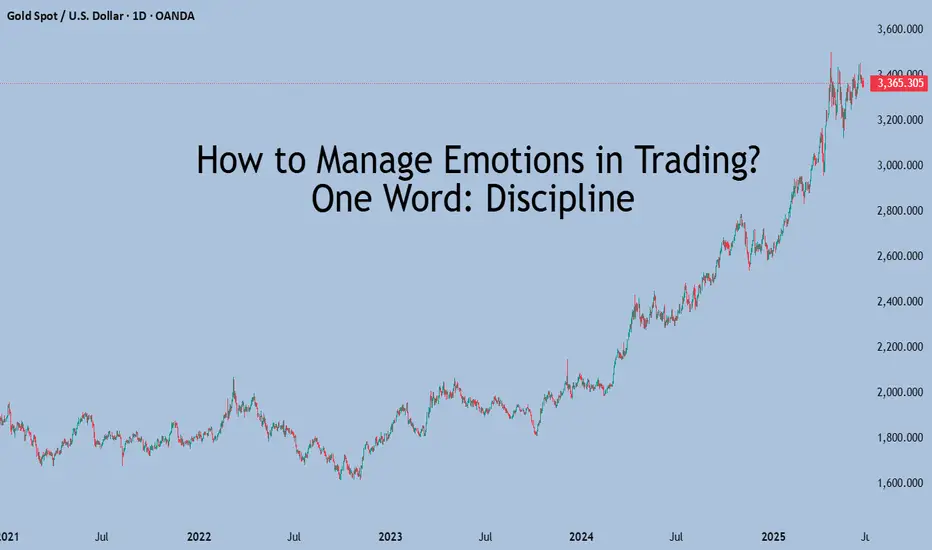How to deal with emotions?
If you don't feel like reading a long explanation — here's the short answer: Discipline.
There are two typical emotional traps in trading:
1. After a big loss:
You feel the urge to recover quickly. Emotions kick in: despair, paralysis, frustration, snapping at loved ones — the classic downward spiral.
2. After a big win:
You feel like a king. “I’ve figured out the market. I’m unstoppable.” This leads to overconfidence, oversized positions, increased risk, and careless spending of profits — all while forgetting that black swans do exist.
What’s the cure in both cases? Discipline.
That’s your weak spot in both scenarios.
When you lose a lot, you shouldn’t even allow deep drawdowns to begin with.
Set clear exit rules:
1. Hard stop-losses.
2. A maximum loss limit (ideally 5–10% of capital), after which you completely exit all positions and take a minimum one-month break from charts and trading activity.
This protects your capital and — even more importantly — your mental health.
If you can’t follow your own stop-loss or take breaks when needed — then you don’t need emotional advice. You need to work on discipline.
When you feel euphoric from profits, this is trickier, but also manageable.
Reduce your position sizes after a major win or take a 2–3 day break to reset your brain and step back from emotional excitement
Again — the tool that helps here is discipline.
So how do you build that discipline?
Discipline isn’t just about trading. It’s a life skill that touches everything — from health to finance to habits. Here's how to develop it:
Start with physical training
Yes, really.
If you’re new, aim for 30 minutes of exercise, 3 times a week.
Even if you’re tired halfway, just walk in place — finish the 30 minutes. This trains your brain to complete what it starts, no matter how you feel.
The self-discipline from training your body will spill into every other area of your life — including trading.
Build simple habits
Start small:
Get up at the first alarm
Make your bed right after waking up
Put away clothes properly
Clean your shoes after coming home
Pick 2–3 micro-habits, and once they stick, your "discipline muscle" will grow. Over time, it becomes a natural skill.
Don’t expect results in the first week
Give yourself 30 days, and you’ll see real change.
If you don't feel like reading a long explanation — here's the short answer: Discipline.
There are two typical emotional traps in trading:
1. After a big loss:
You feel the urge to recover quickly. Emotions kick in: despair, paralysis, frustration, snapping at loved ones — the classic downward spiral.
2. After a big win:
You feel like a king. “I’ve figured out the market. I’m unstoppable.” This leads to overconfidence, oversized positions, increased risk, and careless spending of profits — all while forgetting that black swans do exist.
What’s the cure in both cases? Discipline.
That’s your weak spot in both scenarios.
When you lose a lot, you shouldn’t even allow deep drawdowns to begin with.
Set clear exit rules:
1. Hard stop-losses.
2. A maximum loss limit (ideally 5–10% of capital), after which you completely exit all positions and take a minimum one-month break from charts and trading activity.
This protects your capital and — even more importantly — your mental health.
If you can’t follow your own stop-loss or take breaks when needed — then you don’t need emotional advice. You need to work on discipline.
When you feel euphoric from profits, this is trickier, but also manageable.
Reduce your position sizes after a major win or take a 2–3 day break to reset your brain and step back from emotional excitement
Again — the tool that helps here is discipline.
So how do you build that discipline?
Discipline isn’t just about trading. It’s a life skill that touches everything — from health to finance to habits. Here's how to develop it:
Start with physical training
Yes, really.
If you’re new, aim for 30 minutes of exercise, 3 times a week.
Even if you’re tired halfway, just walk in place — finish the 30 minutes. This trains your brain to complete what it starts, no matter how you feel.
The self-discipline from training your body will spill into every other area of your life — including trading.
Build simple habits
Start small:
Get up at the first alarm
Make your bed right after waking up
Put away clothes properly
Clean your shoes after coming home
Pick 2–3 micro-habits, and once they stick, your "discipline muscle" will grow. Over time, it becomes a natural skill.
Don’t expect results in the first week
Give yourself 30 days, and you’ll see real change.
Disclaimer
The information and publications are not meant to be, and do not constitute, financial, investment, trading, or other types of advice or recommendations supplied or endorsed by TradingView. Read more in the Terms of Use.
Disclaimer
The information and publications are not meant to be, and do not constitute, financial, investment, trading, or other types of advice or recommendations supplied or endorsed by TradingView. Read more in the Terms of Use.
